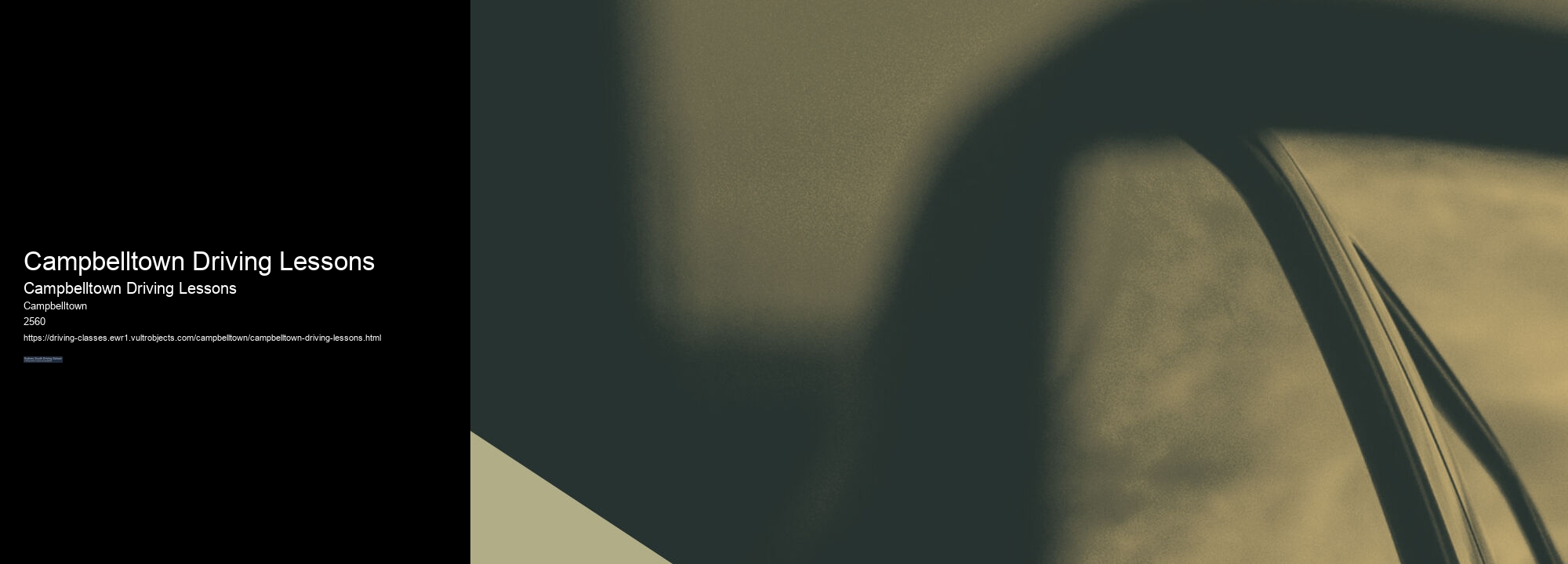
For experienced drivers who want to refresh their skills or improve their driving abilities, Sydney South Driving School also offers refresher courses. These courses are tailored to suit the individual needs of each student and can cover a range of topics, such as defensive driving, parking, and night driving.
The driving school's instructors are patient, friendly, and fully accredited, meaning that they have the necessary qualifications and experience to teach students how to drive safely and confidently. They understand that every student has different learning needs and styles, and they will work with you to tailor a lesson plan that meets your individual needs.
The driving school's instructors use a range of teaching methods and techniques to help students learn to drive. They use visual aids, such as diagrams and videos, to help students understand different driving concepts, and they provide plenty of hands-on experience to help students build their confidence and skills.
Campbelltown Driving LessonsA driving school is a facility that provides professional training to individuals who want to learn how to drive a motor vehicle. It is a place where students can obtain the necessary knowledge and skills required to become safe and responsible drivers on the road.
Driving schools offer various programs that cater to different levels of driving experience. Some schools provide courses for beginners who have no prior driving experience, while others offer advanced courses for experienced drivers who want to enhance their skills. In addition, there are specialized courses available for individuals who want to obtain a commercial driver's license or learn how to operate specific types of vehicles.
The curriculum of a driving school typically includes both classroom instruction and hands-on driving practice. Classroom instruction covers topics such as traffic laws, road signs and markings, defensive driving techniques, and vehicle maintenance. Hands-on practice sessions involve driving under the guidance of a licensed instructor who provides feedback and guidance to the student.
One of the primary benefits of attending a driving school is that it helps to increase the student's confidence on the road. Learning to drive can be a daunting experience, especially for those who have no prior experience. Driving schools provide a safe and controlled environment where students can learn and practice driving skills without the fear of putting themselves or others in danger.
In addition to confidence-building, driving schools also help to reduce the risk of accidents. Students who receive professional training are less likely to be involved in accidents compared to those who learn to drive on their own. This is because driving schools teach students how to handle different driving scenarios, such as adverse weather conditions, heavy traffic, and emergency situations.
Another advantage of attending a driving school is that it helps to save time and money in the long run. Students who learn to drive on their own may take longer to acquire the necessary skills, which can result in more time spent on practicing and increased costs associated with vehicle repairs due to accidents. In contrast, students who attend a driving school are more likely to pass their driving tests on the first attempt, which can save them time and money in the long run.
Overall, attending a driving school is an excellent investment for individuals who want to learn how to drive safely and responsibly. It provides the necessary skills and knowledge needed to become a confident and skilled driver, which can help to reduce the risk of accidents and save time and money in the long run.

Driving courses are designed to help individuals become better, safer drivers. Whether you're a new driver just starting out, or an experienced driver looking to improve your skills, there are driving courses available to meet your needs.
Some of the benefits of taking a driving course include:
Learning defensive driving techniques: Defensive driving is the practice of driving in a way that reduces the likelihood of an accident. A good driving course will teach you how to be aware of your surroundings, anticipate potential hazards, and react appropriately to avoid accidents.
Getting familiar with traffic laws: Traffic laws can be complex and confusing. A driving course will help you understand the rules of the road and how to follow them. This can help you avoid traffic tickets and stay safe on the road.
Gaining confidence: For new drivers, getting behind the wheel can be intimidating. A driving course can help build confidence by providing a safe environment to practice driving skills.
Lowering insurance rates: Many insurance companies offer discounts to drivers who have completed a driving course. This is because drivers who have taken a course are generally considered to be safer and more responsible on the road.
There are many different types of driving courses available, including:
Basic driving courses: These courses are designed for new drivers and cover the basics of driving, such as starting and stopping the vehicle, turning, and parking.
Defensive driving courses: These courses focus on teaching defensive driving techniques and how to avoid accidents.
Advanced driving courses: These courses are designed for experienced drivers and cover more advanced driving techniques, such as high-speed driving and emergency maneuvers.
Teen driving courses: These courses are specifically designed for teenagers and cover topics such as distracted driving, peer pressure, and the risks of driving under the influence.
When choosing a driving course, it's important to consider your own needs and goals. Make sure to research the course thoroughly and choose a reputable provider. With the right driving course, you can become a safer, more confident driver and enjoy the many benefits of being on the road.
Obtaining a driver's license is an essential part of being able to legally drive a vehicle. However, if you are planning to move to a different country, you may need to convert your overseas license to a local license. The process of converting your overseas license can be complex and may vary depending on the country you are moving to.
Here are some things to keep in mind when converting your overseas license:
Research the local requirements: The requirements for converting an overseas license can vary greatly from country to country. Some countries may require you to take a driving test, while others may only require a written test or a vision test. Research the local requirements in advance to avoid any surprises.
Check the validity of your license: In some cases, your overseas license may not be valid in the new country. Some countries have reciprocal agreements that allow drivers to use their overseas license for a certain period of time, while others require you to obtain a local license as soon as you arrive.
Gather the necessary documents: To convert your overseas license, you will typically need to provide proof of identity, residency, and your driving history. This may include your passport, proof of address, and a driving record from your home country.
Consider taking a driving course: If you are required to take a driving test, consider taking a driving course to help prepare you. Even if a driving test is not required, taking a course can help you become familiar with local driving laws and road conditions.
The length of a driving course can vary depending on the individual's needs and the driving school's curriculum. In general, most driving schools offer courses that range from a few days to several weeks or even months. The duration of the course can also depend on the learner's ability and the frequency of lessons.
Attending a driving school can provide learners with several benefits, such as developing good driving habits, receiving professional instruction from experienced instructors, gaining knowledge of traffic rules and regulations, and improving overall driving safety. Driving schools can also help learners to gain confidence and reduce the stress associated with learning to drive.
Many driving schools offer both automatic and manual cars for lessons. However, this can vary depending on the driving school's resources and the preferences of the learner. It is important to check with the driving school beforehand to determine which types of vehicles are available for lessons. Additionally, some driving schools may charge extra fees for learners who wish to take lessons in a manual car.